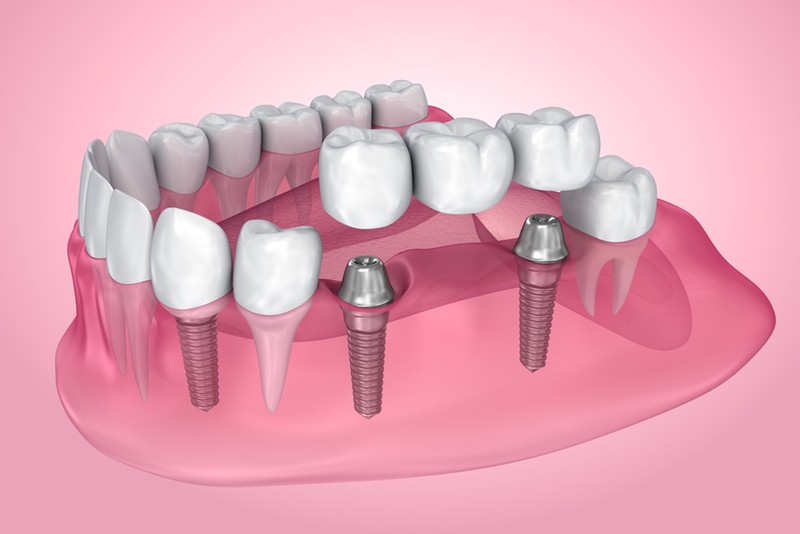In recent years, dental implants have become one of the most popular solutions for replacing missing teeth. Whether due to injury, decay, or other dental issues, missing teeth can lead to various complications, including difficulty in chewing, speech problems, and self-esteem issues. Dental implants offer a promising solution, but like any medical procedure, they come with their own set of advantages and disadvantages. This comprehensive guide will help you understand the pros and cons of dental implants, enabling you to make an informed decision about your oral health.
What Are Dental Implants?
Before diving into the pros and cons, it’s essential to understand what dental implants are. A dental implant is an artificial tooth root, usually made of titanium, that is surgically placed into the jawbone. This implant serves as a sturdy base for a replacement tooth, crown, bridge, or denture. Unlike other tooth replacement options, such as dentures or bridges, dental implants are designed to mimic the look and function of natural teeth closely.
The Pros of Dental Implants
1. Improved Appearance and Confidence
One of the most significant advantages of dental implants is their ability to restore a natural-looking smile. The implants are designed to blend seamlessly with your existing teeth, making them virtually indistinguishable from natural teeth. This aesthetic appeal can boost your confidence and self-esteem, allowing you to smile, speak, and eat without worrying about your appearance.
2. Long-Lasting and Durable
Dental implants are known for their durability and longevity. Unlike dentures, which may need to be replaced or adjusted every few years, dental implants can last a lifetime with proper care. The titanium used in the implants is biocompatible, meaning it fuses with the jawbone and becomes a permanent part of your mouth. This fusion process, known as osseointegration, provides a stable foundation for the replacement tooth and ensures that the implant remains securely in place.
3. Improved Oral Health
Dental implants offer a superior solution for maintaining oral health. Unlike traditional bridges, which require the adjacent teeth to be filed down to support the bridge, dental implants do not affect surrounding teeth. This preservation of natural teeth helps maintain the overall structure of your mouth and reduces the risk of tooth decay and gum disease. Additionally, dental implants help stimulate the jawbone, preventing bone loss and maintaining the shape of your face.
4. Enhanced Functionality
When it comes to functionality, dental implants outperform other tooth replacement options. Since they are anchored directly into the jawbone, they provide a stable base for chewing and speaking. This stability allows you to eat a wide variety of foods without worrying about your teeth slipping or causing discomfort. Unlike dentures, which can sometimes cause difficulty in speaking, dental implants enable you to speak clearly and confidently.
5. Convenience and Comfort
Dental implants offer a level of comfort and convenience that is unmatched by other tooth replacement options. Once the implant has healed and the crown is placed, it feels and functions just like a natural tooth. There’s no need to remove them for cleaning, and you don’t have to worry about adhesives or special cleaning solutions. With dental implants, you can maintain your regular oral hygiene routine, including brushing and flossing.
The Cons of Dental Implants
1. High Cost
One of the most significant drawbacks of dental implants is their cost. The procedure can be expensive, especially when compared to other tooth replacement options like dentures or bridges. The cost of dental implants varies depending on factors such as the number of implants needed, the complexity of the procedure, and the materials used. While dental implants are a long-term investment in your oral health, the upfront cost can be prohibitive for some individuals.
2. Lengthy Treatment Process
The process of getting dental implants can be lengthy and requires multiple visits to the oshkosh dentists. After the initial consultation and planning, the implant is surgically placed into the jawbone. It can take several months for the implant to fully integrate with the bone through osseointegration. Once the implant has fused with the bone, the replacement tooth or crown is attached. This entire process can take anywhere from three to nine months or longer, depending on the individual’s healing time and any additional procedures required.
3. Surgical Risks
As with any surgical procedure, there are risks associated with dental implants. While the procedure is generally safe, complications such as infection, nerve damage, or sinus issues can occur. In some cases, the implant may not fuse with the jawbone properly, leading to implant failure. It’s essential to discuss these risks with your dentist and ensure that you are a good candidate for the procedure before moving forward.
4. Potential for Bone Loss
While dental implants help prevent bone loss by stimulating the jawbone, there is still a risk of bone loss over time. This risk is higher in individuals with existing bone loss or those who suffer from conditions like osteoporosis. In some cases, a bone graft may be necessary to provide enough support for the implant, which can add to the overall cost and length of treatment.
5. Maintenance and Care
While dental implants are low-maintenance compared to dentures, they still require proper care to ensure their longevity. It’s essential to maintain good oral hygiene, including regular brushing, flossing, and dental check-ups. Failure to care for your implants can lead to gum disease or peri-implantitis, a condition that affects the tissue around the implant and can lead to implant failure. Additionally, while the implant itself may last a lifetime, the crown or replacement tooth may need to be replaced after 10-15 years due to wear and tear.
Who Is a Good Candidate for Dental Implants?
Not everyone is a suitable candidate for dental implants. Several factors determine whether you are a good candidate for the procedure:
- Adequate Bone Density:Sufficient bone density in the jaw is necessary to support the implant. If you have experienced significant bone loss, a bone graft may be required before the implant can be placed.
- Healthy Gums:Healthy gums are essential for the success of dental implants. Individuals with gum disease or other oral health issues may need to address these conditions before undergoing implant surgery.
- Non-Smokers:Smoking can interfere with the healing process and increase the risk of implant failure. While smokers can still receive dental implants, quitting smoking before and after the procedure can significantly improve the chances of success.
- Overall Health:Good overall health is important for any surgical procedure, including dental implants. Conditions such as diabetes, heart disease, or a weakened immune system can affect the healing process and increase the risk of complications.
Conclusion: Is Dental Implant Right for You?
Dental implants offer a highly effective and long-lasting solution for missing teeth, providing numerous benefits in terms of appearance, functionality, and oral health. However, they also come with certain disadvantages, including cost, treatment duration, and surgical risks. Deciding whether dental implants are right for you requires careful consideration of these pros and cons, as well as a thorough consultation with your dentist.
If you are considering dental implants, it’s essential to weigh the long-term benefits against the potential risks and costs. With proper care and maintenance, dental implants can provide a permanent solution to tooth loss, helping you regain your smile and confidence for years to come






